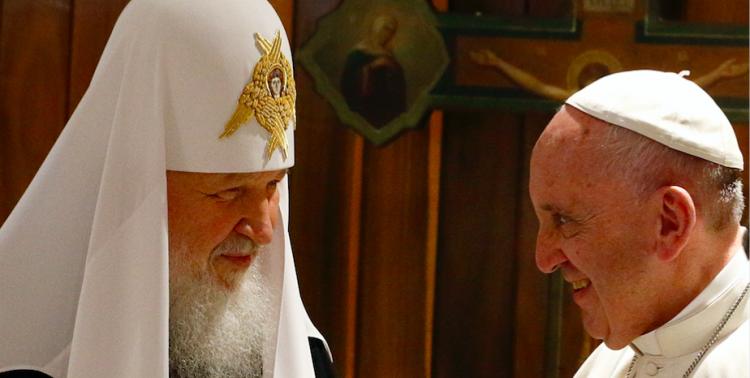How the Vatican is encouraging dialogue between Russia and the West
The Holy See is aware of the concerns of the international community; however, especially during what Pope Francis has called “this piecemeal third world war that we are living through,” it believes dialogue should be promoted over confrontation .
Sep 10, 2017

By Gerard O’Connell
It is no secret: The relationship between the Russian Federation and the Holy See has been improving. This development comes when Russia’s ties to the European Union and the United States — and the Holy See’s own relationship with the United States due to positions taken by the Trump administration on issues like climate change and immigration—are strained. Western powers have imposed sanctions attempting to isolate Moscow and trying to get the government to change its course in Ukraine and elsewhere.
The Holy See is aware of the concerns of the international community; however, especially during what Pope Francis has called “this piecemeal third world war that we are living through,” it believes dialogue should be promoted over confrontation .
President Vladimir Putin has visited the Vatican five times and has already had two private conversations with Pope Francis, in 2013 and 2015. He is expected to meet him again next January, when he comes for the opening of a Russian art exhibition in the Vatican.
Moreover, Russia’s Foreign Minister, Sergey Lavrov, has met his Vatican counterparts on several occasions and engaged in what sources say were “substantial, constructive discussions.”
This developing friendship has been matched by an ever-improving relationship between the Russian Orthodox Church, with its 150 million members, and the Holy See. Pope Francis has played a huge role in this with his approach to the Orthodox Church and his willingness to meet with Patriarch Kirill of Moscow. Relations between the Moscow Patriarchate and the Holy See have been encouraged by President Putin, who has embraced the Orthodox faith not only at a personal level but also as part of his effort to consolidate his power at home. Last year, Patriarch Kirill and Pope Francis met in Havana in February; a month later, the Pope appointed one of the Holy See’s top diplomats, Archbishop Celestino Migliore, as nuncio to Russia.
The Vatican’s secretary of state, Cardinal Pietro Parolin, visited Russia from Aug. 20 to 24, upon an invitation from Russian state and Church authorities. (This was the first visit by a secretary of state since 1999, and the most significant since Cardinal Agostino Casaroli’s 1990 visit following the collapse of the Soviet Union.) Cardinal Parolin had what he defined as “important and constructive encounters” with President Putin, Foreign Minister Lavrov, Patriarch Kirill and Metropolitan Hilarion, president of the Moscow Patriarchate’s Department for External Church Relations and the number two official in that patriarchate.
Cardinal Parolin met with President Putin at the latter’s summer residence in Sochi. While most of their conversations have remained confidential, both sides have revealed some of the major topics discussed, including the conflicts in the Middle East, particularly in Syria, and the situation of Christians and other minorities there and the need to protect them. The day after, he met with Mr. Lavrov and discussed, among other issues, combating terrorism and extremism, promoting dialogue, and protecting the interests of ethnic, religious and political groups in any final settlement in those countries in conflict. They also spoke about the international efforts to bring peace to Syria, including the Astana process, and the UN-sponsored Geneva talks.
The cardinal and his hosts agreed on the need to resume the Palestinian-Israeli talks and to work for a final settlement in accordance with the UN decisions. President Putin met Israeli Prime Minister Benjamin Netanyahu on the same day he received the cardinal. Cardinal Parolin also asked his Russian counterparts to facilitate a political settlement to the dramatic crisis in Venezuela.
Mr. Lavrov said Russia supports the Holy See’s efforts to promote negotiations for a peaceful solution in Venezuela, but strongly opposes any outside attempt to arm the opposition or use military force.
When discussing the sensitive political situation in Ukraine, one he knows well having visited the country last year, Cardinal Parolin insisted — it seems also in relation to the annexation of Crimea — on the need to fully respect international law. The Holy See is concerned by the lack of movement in the implementation of the Minsk Agreement, and the cardinal urged his Russian hosts to take “concrete steps” that could help advance the peace process — for example, by the liberation of prisoners. He presented this as a humanitarian gesture that could give new impetus to the process. It remains to be seen whether they act on it, but during the visit, Mr Lavrov publicly acknowledged that the Russians “appreciate” the Vatican’s support of the Minsk Agreement.
Speaking to Vatican Radio on his return home, Cardinal Parolin stated, “Russia, for its geographical position, its history, its culture, and its past, present, and future, has an important role to play in the international community and in the world.” He added that the nation’s leaders “must truly strive to put the higher interests of peace above all other interests.” The cardinal’s words appeared to contain another message, too, albeit unspoken, for Western powers: Do not isolate Russia. -- America Magazine







Total Comments:0